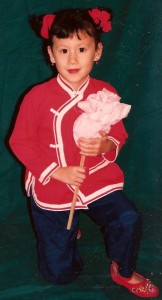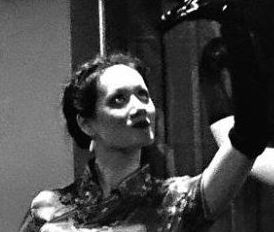Whasian. Amerasian. Ainoko. Hafu. Hapa. Halfie. Mixed-blood. Mixed race. Mixed up. I spent my childhood and adolescence grappling with my biracial heritage. Taiwanese mom, Caucasian dad. Half-half. Caught between East and West. Growing up biracial in a suburban town in New Jersey meant conflict. Even if none of my peers had called me yellow, almond eyes, Chink.
 I used to enjoy ribbon dancing in front of my classmates. Used to enjoy when my mom, wearing a qipao, gave them handouts: Year of the Horse, Monkey, Sheep. As a child, it’s easier to feel wholly proud. Hair up in double buns, ribbon waving, I smiled. I wore my background, my diversity, for all to see.
I used to enjoy ribbon dancing in front of my classmates. Used to enjoy when my mom, wearing a qipao, gave them handouts: Year of the Horse, Monkey, Sheep. As a child, it’s easier to feel wholly proud. Hair up in double buns, ribbon waving, I smiled. I wore my background, my diversity, for all to see.
When did that change? There was no singular moment; there were a series of moments. But it starts with one. One event, which stirs latent feelings, all of which the mind catalogues into memory.
At Chinese school, sitting next to my dad, face burning under the stares. I felt questions form in their minds, build in their throats, spill out their mouths. “What are you doing here? How can he translate Chinese to you?” Studying the pictures made of lines, unable to remember what they meant. My brother and I complained to our mom. She eventually let us quit.
The countless prying of strangers. At Asian or American supermarkets, at clothing stores, at ticket counters, at Dairy Queen. Waiting in line to register for camp. “Where are you from?” A conversation starter for them; what felt like an ender for me. “No fighting or rudeness. Be polite. Smile, answer, and nod. Only curious.”
Children like community and continuity. How do they solidify their place? By pointing out difference. “You can’t celebrate St. Patrick’s Day. You can’t be Irish. German, too? Right, and I’m Chinese. You’re so gullible. Obviously I’m not Chinese.”
By the time I reached adolescence, the incidents blurred into montages. The non-Asian faces faded, but the voices remained: “You’re just a Chink. Chinky. Why do you always say Taiwanese? You’re all the same. Say something in Chinese. What do you mean, you can’t speak it? Tell me what dog tastes like. Your mom’s got a funny accent. Your dad’s white? Those red highlights can’t be real.”
Then the attacks from Asians—from the people supposed to be on my side. “You’re not really Chinese. That’s not how you say it. Who taught you how to hold chopsticks? You aren’t Asian enough to understand. It’s different when you’ve got two Asian parents.”
With each new encounter, my shame grew. I wondered what it’d be like. To be whole. Just one thing. Would they accept me then? I blamed my parents. I hated myself for being both.
In college, I asked myself new questions. Who did I want to be? Where did I fit? Should I want to fit? What should I tell other people? How can I reclaim my unpleasant experiences? Compared to my black friends, did I have the right to complain? Where are the answers?
Now I think I know. Here’s my anti-quest: I should stop looking for answers. They will come to me—or they won’t. I’m in a continual state of flux. And that’s life. I strive to accept the torment. —Joy Stoffers, Festival Blogger
